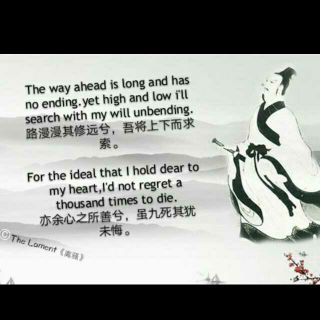
介绍:
【端午节来历】
The Dragon Boat Festival, the 5th day of the 5th lunar month, has had a history of more than 2,000 years. It is usually in June in the Gregorian calendar.
端午节是古老的传统节日,始于中国的春秋战国时期,至今已有2000多年历史。
There are many legends about the evolution of the festival, the most popular of which is in commemoration of Qu Yuan (340-278 BC). Qu Yuan was minister of the State of Chu and one of China's earliest poets. In face of great pressure from the powerful Qin State, he advocated enriching the country and strengthening its military forces so as to fight against the Qin. However, he was opposed by aristocrats headed by Zi Lan, and later deposed and exiled by King Huai.
据《史记》“屈原贾生列传”记载,屈原,是春秋时期楚怀王的大臣。他倡导举贤授能,富国强兵,力主联齐抗秦,遭到贵族子兰等人的强烈反对,屈原遭馋去职,被赶出都城,流放到沅、湘流域。
In his exiled days, he still cared much for his country and people and composed immortal poems including Li Sao (The Lament), Tian Wen (Heavenly Questions) and Jiu Ge (Nine Songs), which had far-reaching influences. In 278 BC, he heard the news that Qin troops had finally conquered Chu's capital, so he finished his last piece Huai Sha (Embracing Sand) and plunged himself into the Miluo River, clasping his arms to a large stone. The day happened to be the 5th of the 5th month in the Chinese lunar calendar.
他在流放中,写下了忧国忧民的《离骚》、《天问》、《九歌》等不朽诗篇,独具风貌,影响深远(因而,端午节也称诗人节)。公元前278年,秦军攻破楚国京都。屈原眼看自己的祖国被侵略,心如刀割,但是始终不忍舍弃自己的祖国,于五月五日,在写下了绝笔作《怀沙》之后,抱石投汨罗江身死,以自己的生命谱写了一曲壮丽的爱国主义乐章。
After his death, the people of Chu crowded to the bank of the river to pay their respects to him. The fishermen sailed their boats up and down the river to look for his body. People threw into the water zongzi (pyramid-shaped glutinous rice dumplings wrapped in reed or bamboo leaves) and eggs to divert possible fish or shrimp from attacking his body. An old doctor poured a jug of reaglar wine (Chinese liquor seasoned with realgar) into the water, hoping to turn all aquatic beasts drunk. That's why people later followed the customs such as dragon boat racing, eating zongzi and drinking realgar wine on that day.
传说屈原死后,楚国百姓哀痛异常,纷纷涌到汨罗江边去凭吊屈原。渔夫们划起船只,在江上来回打捞他的真身。有位渔夫拿出为屈原准备的饭团、鸡蛋等食物,“扑通、扑通”地丢进江里,说是让鱼龙虾蟹吃饱了,就不会去咬屈大夫的身体了。人们见后纷纷仿效。一位老医师则拿来一坛雄黄酒倒进江里,说是要药晕蛟龙水兽,以免伤害屈大夫。后来为怕饭团为蛟龙所食,人们想出用楝树叶包饭,外缠彩丝,发展成棕子。
1端午节吃什么?
zongzi
Glutinous rice filled with meat, nuts or bean paste and wrapped in bamboo leaves. The custom of eating zongzi is now popular in North and South Korea, Japan and Southeast Asian nations.
糯米一般先用肉、坚果或者豆沙馅填充起来,然后再用竹叶包裹起来。这是和端午节的历史意义紧密结合在一起的。吃粽子的习俗,现在已经在朝鲜、韩国、日本和东南亚国家流行开来。
2端午节玩什么?
Dragon boat race
Dragon boat racing is an indispensable part of the festival, held all over the country. As the gun is fired, people will see racers in dragon-shaped canoes pulling the oars harmoniously and hurriedly, accompanied by rapid drums, speeding toward their destination.
赛龙舟是端午节重要的组成部分,在全国上下都会进行。枪声一响,人们就会看到龙舟上的运动员,伴随着快速的鼓点,迅速又整齐划一地划动船桨,冲向终点。
3端午节戴什么?
sachet
On Dragon Boat Festival, parents also need to dress their children up with a sachet. They first sew little bags with colorful silk cloth, then fill the bags with perfumes or herbal medicines(草药), and finally string them with silk threads. The sachet will be hung around the neck or tied to the front of a garment as an ornament. They are said to be able to ward off evil.
端午节最有特色的饰物就是香包。小孩佩戴香包,传说有避邪驱瘟之意。用含有多种香味的药用植物做成的香包也可以预防疾病。
4端午节挂什么?
branches of moxa[艾蒿]
Hang branches of moxa and calamus [菖蒲]around the doors of their homes and display portraits of evil's nemesis, Chung Kuei.
挂艾叶菖蒲和悬钟馗像都是为了驱疾避凶,讨个吉利。
大家还在听

